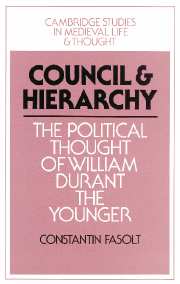Book contents
- Frontmatter
- Contents
- Acknowledgments
- List of abbreviations
- List of manuscript sigla
- INTRODUCTION
- PART I THE FORMATION OF INTEREST
- PART II THE ASSERTION OF JUSTICE
- 4 THE THEORY OF REFORM
- 5 ‘MAGNUS ORDO DIFFERENTIE’
- 6 ‘RES PUBLICA’
- 7 THE PERVERSION OF ORDER
- RESULTS: LIBERTY AND LAW
- PART III THE INCIDENCE OF POWER
- CONCLUSION
- Appendix: A note on texts and citations
- Bibliography
- Concordance
- Index
- Cambridge studies in medieval life and thought Fourth series
6 - ‘RES PUBLICA’
Published online by Cambridge University Press: 06 July 2010
- Frontmatter
- Contents
- Acknowledgments
- List of abbreviations
- List of manuscript sigla
- INTRODUCTION
- PART I THE FORMATION OF INTEREST
- PART II THE ASSERTION OF JUSTICE
- 4 THE THEORY OF REFORM
- 5 ‘MAGNUS ORDO DIFFERENTIE’
- 6 ‘RES PUBLICA’
- 7 THE PERVERSION OF ORDER
- RESULTS: LIBERTY AND LAW
- PART III THE INCIDENCE OF POWER
- CONCLUSION
- Appendix: A note on texts and citations
- Bibliography
- Concordance
- Index
- Cambridge studies in medieval life and thought Fourth series
Summary
As Pope Gregory points out, subjects must be admonished not to humble themselves excessively, for if they bow to the authority of others more than necessary, they may be forced to venerate their vices.
William DurantThe ‘great order of difference’ dominates Durant's ideas about reform, but it is insufficient for a complete interpretation of the Tractatus Maior. Side by side with exemplary efficiency and obedience to law one finds ideas about the proper way to organize a body politic that no interpretative artifice can fit into the notion of hierarchy and that give a different meaning to Durant's conciliar demand. These ideas are no more systematically elaborated than the great order of difference itself. Sometimes they appear in the form of asides that seem to leap from the page as foreign elements in the surrounding congeries of medieval jurisprudence. At other times they take the form of suggestions which in spite of their apparent harmony with hierarchical assumptions leave the reader with a nagging feeling that they lead in an entirely different direction. Only rarely do they occur as straightforward statements of principle. Fortunately for our purposes those rare occasions leave no doubt that the treatise embodies an idea of political organization which does not merely modulate the themes of hierarchy – it is opposed to them in principle. This idea of order is republican.
- Type
- Chapter
- Information
- Council and HierarchyThe Political Thought of William Durant the Younger, pp. 217 - 246Publisher: Cambridge University PressPrint publication year: 1991

